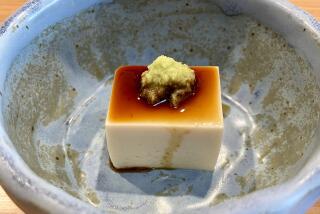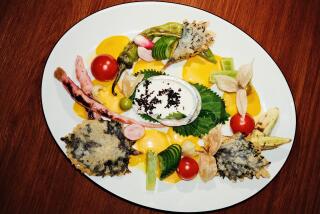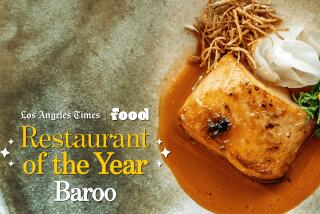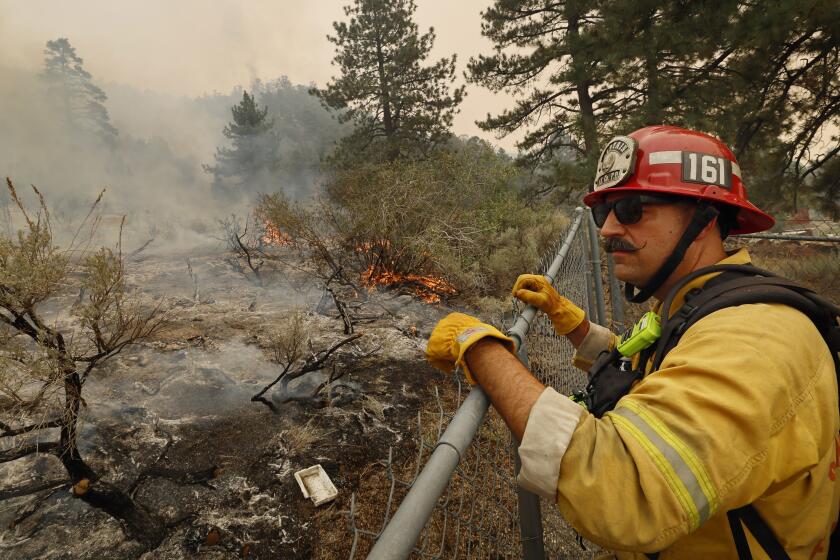‘Iron Chef’ fundraiser in L.A. tries to cook up interest in Japan
It’s tough to be Japan these days. China is bigger, with an economy that surpassed Japan’s two years ago. South Korea is more hip, with addicting soap operas and “Gangnam Style” cool.
But Japan has what neither East Asian country does: the “Iron Chef” cooking show, a campy cult sensation that has spawned knockoffs in America, Israel, Australia, Britain, Thailand and elsewhere.
The show’s most celebrated chef, Hiroyuki Sakai, made his first appearance in Los Angeles this month to raise money for educational programs that backers hope will boost Japan’s public profile among youth. Drawing 225 fans to the $450-a-plate event, Sakai and two Los Angeles chefs whipped out a six-course dinner featuring such creations as Wagyu beef, Tasmanian salmon, octopus carpaccio and sweetbreads and abalone croquette.
Unlike the show, the Los Angeles event at the InterContinental Los Angeles Century City did not feature a cooking competition with a mystery ingredient, celebrity judges or an outlandishly costumed host. But there was plenty of kinetic energy as Sakai and InterContinental executive chef Jonathan Wood bopped from the kitchen to the stage to answer audience questions. Kitchen preparations were beamed to huge video screens in the dining hall, and soaring music heralded the serving of each course.
By the end of the night, the Iron Chef had helped raise $100,000 for youth programs offered by the Japan America Society of Southern California. Later, Sakai said he was particularly gratified by the Los Angeles audience’s standing ovation and urged his fellow Japanese to continue competing globally by having pride and confidence in their talents.
Douglas Erber, the society’s president, said he hoped the proceeds would help new generations of Americans learn and care about Japan.
“If we’re going to foster the future of U.S.-Japan relations, we need to engage youth,” he said.
Erber said American interest in Japan has waned since that nation’s once-booming economy dropped into a long and deep recession beginning in the 1990s.
Reflecting those trends, the century-old society’s membership declined by half from the 1980s to the late 1990s but has begun to recover and now totals about 2,000 individuals and 125 corporations, Erber said.
But on high school campuses, more students are shifting to study Mandarin amid China’s economic rise. Enrollment in Chinese language classes at public high schools tripled from 2004 to 2008, compared with a 17% rise in Japanese studies during that same period, according to a survey released last year by the American Council on the Teaching of Foreign Languages.
To help promote interest in Japan, Erber said the society planned to offer its first-ever Japan Bowl for Southern California high school Japanese language students next spring. The academic competition, modeled on popular quiz shows, will test knowledge of the Japanese language, culture and Japanese American experience; local winners will advance to a national competition in Washington, D.C., and a chance to win a trip to Japan.
“We want to thank students for choosing Japanese as their language of choice when they could have chosen Spanish or another language,” Erber said.
The society also hopes to expand its Japan in a Suitcase program, which brings Japanese school uniforms, lunch kits, textbooks and other items to Southern California classrooms.
The organization’s other educational events include an annual Japanese kite workshop, in which a Japanese kite master teaches more than 1,000 underserved Los Angeles students in a dozen schools the art of traditional kite-making from bamboo and Japanese washi paper. The Japan America Kite Festival at Seal Beach attracts more than 12,000 people.
Erber said the society hoped eventually to bring on a full-time educational director to expand such learning opportunities for students about Japan and the U.S.-Japan relationship.
“We’re hoping that, by opening their eyes to another culture, we’ll help stimulate them to continue to explore the world around them,” Erber said.
Fans who flocked to the recent Iron Chef dinner, which was supported by the InterContinental and Nitto Tire U.S.A. Inc., said Japan will always be a cultural and economic pacesetter despite its dip in U.S. public awareness.
Jon Kroll, a Los Angeles TV producer, said cultural trends may come and go in America — the film “Slumdog Millionaire” helped fuel interest in India for a time, and South Korea seems hot today, he said. But the inventive genius that produced such global hits as sushi, Hello Kitty and “Iron Chef” will keep Japan in the forefront, he said.
“Japan will rise again,” Kroll said.
More to Read
Sign up for Essential California
The most important California stories and recommendations in your inbox every morning.
You may occasionally receive promotional content from the Los Angeles Times.











